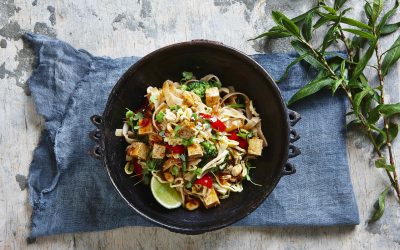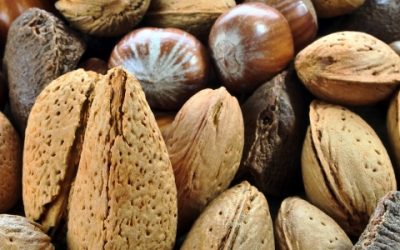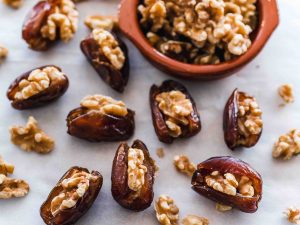Carbohydrate is the primary source of energy for your body and its functions since it is simpler to metabolise than fats or amino acids. All carbohydrates are broken down into glucose by the body. The more simple the carbohydrate, the quicker it is converted to glucose, causing an influx of glucose into the blood. This creates a spike in the levels of blood sugar (or blood glucose).
Your body reacts to bring blood sugar levels back to a normal level by insulin (a hormone excreted by the pancreas). Insulin helps convert the blood sugar to glycogen, where it is stored in the muscles and tissues. Once these stores are full, the excess blood sugar is converted to fat. Read that sentence again. Yes, converted to fat.
But hang on, it’s a carbohydrate not a fat! And that has been where society has gone wrong since the 1980’s with the introduction of ‘diet’ food and low-fat diets. Diets aimed to cut calories – usually by cutting fat, since fat has the most calories per gram. On paper that would be the logical thing to do however, without fully understanding the complexities of fat and carbohydrate metabolism the reality hasn’t been as good as the theory. Again, I’ll remind you that all calories are not equal. There’s a bit more to it than that. By reducing fat and replacing it with refined, High GI carbohydrates to give it flavour, diet food manufacturers have in fact made you fatter. Good for business I guess!
So you want (need) to cut that sugar habit? Here’s my Top Ten Tips to help you quit.
TIPS TO HELP YOU QUIT SUGAR
- Don’t use sugar as a reward. Wrinkles, fat around your tummy and bad teeth are not rewards. But a trip to a Spa is!
- Eat plenty of chromium. This helps reduce cravings. Chromium is found in eggs, nuts, mushrooms, wholegrains, asparagus, liver and molasses.
- Take glutamine. This supplement also helps reduce sweet cravings. A teaspoon in water will usually knock that sweet craving on its head.
- Include purine-rich proteins in your diet. Sugar cravings are often a sign of a lack of protein. Dark meats contain more purines. If you’re vegetarian; kidney beans, lima beans, mushrooms, navy beans, oatmeal and peas are also good sources.
- Eat sweet vegetables and fruit. These are naturally sweet, healthy and delicious. That said, fruit is high in sugar and is best eaten in moderation and with protein (such as nuts or cheese) to reduce the insulin spike. The best fruit choice is thin-skinned, darker fruits, such as berries, as they are highest in antioxidants.
- Use gentle sweetners (Honey, maple syrup etc). Avoid chemicalised, artificial sweeteners and foods with added sugar. Use gentle sweeteners like raw Manuka honey, maple syrup, brown rice syrup, dried fruit, stevia and barley malt, again in moderation. If you need a sweet kick or are baking cakes, try Stevia, a herb that is 200 times sweeter than sugar. Also try Natvia, a new natural product that is derived from the freshest tips of Stevia plants and tastes just like sugar. It’s is a careful blend of Stevia and a naturally occurring nectar (known as Erythritol), which is found in melons and grapes. I’m a baker and I either use pear juice concentrate, dates or coconut sugar, to sweeten cakes and slices. They have a much lower GI than sugar and added nutrients. Remember sugar is a totally empty calorie substance adding nothing to you health.
- Get more sleep, rest and relaxation. Simple carbohydrates, such as sugar, are the most readily usable forms of energy for an exhausted body and mind. If you are in a chronic state of stress or sleep deprivation, your body will crave the quickest form of energy there is: sugar.
- Eliminate fat-free or low-fat packaged snack-foods. These foods contain high quantities of sugar to compensate for the lack of flavour and fat, sending you on the roller-coaster ride of sugar highs and lows.
- Experiment with spices. Use coriander, cinnamon, nutmeg, cloves and cardamom to naturally sweeten your foods and reduce cravings.
- Slow down and find sweetness in non-food ways! Every craving is not a signal that your body biologically requires sugar. Cravings often have a psychological component. By identifying the psychological causes of food cravings and substituting lifestyle and relationship adjustments accordingly, you can begin to find balance and take charge of your health.


















